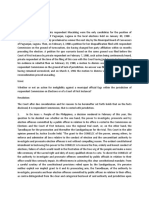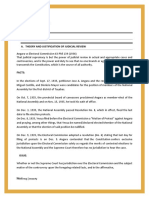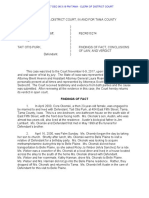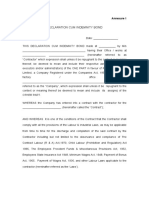G R - No
G R - No
Uploaded by
Athena JbCopyright:
Available Formats
G R - No
G R - No
Uploaded by
Athena JbOriginal Description:
Original Title
Copyright
Available Formats
Share this document
Did you find this document useful?
Is this content inappropriate?
Copyright:
Available Formats
G R - No
G R - No
Uploaded by
Athena JbCopyright:
Available Formats
8/13/2017 G.R. No.
71908
In G.R. No. L71688 filed on August 17, 1985, Arturo M. de Castro and Perfecto L. Cagampang, claiming to be
members of good standing of the Integrated Bar of the Philippines and taxpayers, filed a petition with this Court for
certiorari to annul the resolution of the Committee on Justice, Human Rights and Good Government, the very same
resolution subject of the present petition, dismissing the complaint for the impeachment of the President of the
Philippines signed by the petitioners in the present case, and mandamus to compel said Committee on Justice and
the Batasan, represented by its Speaker, to give due course to said complaint for impeachment. In denying due
course to said petition and dismissing outright the same, We held:
1. The l973 Constitution has vested in the Batasan Pambansa the exclusive power to initiate, try and decide all cases
of impeachment. The action of the Committee on Justice of the Batasan to whom the complaint for the impeachment
of the President had been referred dismissing said petition for being insufficient in form and substance involves a
political question not cognizable by the Courts. The dismissal of said petition is within the ambit of the powers vested
exclusively in the Batasan by express provision of Sec. 2, Article XIII of the Constitution and it is not within the
competence of this Court to inquire whether in the exercise of said power the Batasan acted wisely. There is no
allegation in the petition for certiorari that in the exercise of its powers the Batasan had violated any provision of the
Constitution. The fact that the Committee on Justice dismissed the petition on the same day it was filed after
deliberating on it for several hours as reported in the newspapers, radio and television (which must have been the
basis of petitioners' claim that the Committee had acted with undue haste in unceremoniously dismissing the
complaint for impeachment) does not provide basis for concluding that there had been a violation of any provision of
the Constitution which would justify the Court's intervention to ensure proper observance of constitutional norms and
conduct. Beyond saying that the Batasan may initiate impeachment by a vote of at least onefifth of all its Members
and that no official shall be convicted without the concurrence of at least twothirds of all the members thereof, the
Constitution says no more. It does not lay down the procedure to be followed in impeachment proceedings. It is up to
the Batasan to enact its own rules of procedure in said impeachment proceedings, which it had already done, The
interpretation and application of said rules are beyond the powers of the Court to review. The powers of the Batasan
to dismiss a petition for impeachment which in its judgment it finds not meritorious or defective in form and substance
are discretionary in nature and, therefore, not subject to judicial compulsion.
2. The doctrine of separation of powers still exists under the 1973 Constitution though in a modified form made
necessary because of the adoption of certain aspects of the parliamentary system in the amended 1973 Constitution.
The major powers of the Government have been distributed by the Constitution to the President, who is the head of
the State and chief executive of the Republic, the Batasan Pambansa and the Judiciary. Under the doctrine of
separation of Powers as interpreted by the decisions of the Court, mandamus will not he from one branch of the
government to a coordinate branch to compel performance of duties within the latter's sphere of responsibility. More
specifically, this Court cannot issue a writ of mandamus against the Batasan to compel it to give due course to the
complaint for impeachment. 1
We did not dismiss outright the present petition as We did G.R. No. L71688 but required respondents to comment
thereto in view of the claim of petitioners that the provisions of the Rules of Procedure in Impeachment Proceedings,
more specifically Sections 4, 5, 6 and 8 pursuant to which the Batasan Committee on Justice, Human Rights and
Good Government had dismissed Resolution No. 644 and the complaint for the impeachment attached thereto are
unconstitutional, implying thereby that the Batasan or the Committee thereof had, in the exercise of powers vested
upon it by the Constitution, transgressed or violated the Constitution, certainly a justiciable question.
http://www.lawphil.net/judjuris/juri1986/feb1986/gr_71908_1986.html 1/1
You might also like
- Form No - Iv Government of Kerala Certificate of Marriage: (See Rule 11 (1) )Document1 pageForm No - Iv Government of Kerala Certificate of Marriage: (See Rule 11 (1) )Hasna FizelNo ratings yet
- Online Indian Law OutlineDocument65 pagesOnline Indian Law Outlinemanny n100% (3)
- Romulo vs. Yniguez, G.R. No. 71908. February 4, 1986Document7 pagesRomulo vs. Yniguez, G.R. No. 71908. February 4, 1986Mary Divina FranciscoNo ratings yet
- Romulo V YniguezDocument2 pagesRomulo V YniguezEzra Hilary CenizaNo ratings yet
- G.R. No. 71908 - Romulo v. YñiguezDocument9 pagesG.R. No. 71908 - Romulo v. YñiguezAmielle CanilloNo ratings yet
- Angara Vs - Electoral CommissionDocument40 pagesAngara Vs - Electoral Commissionmichael jan de celisNo ratings yet
- Decision (En Banc) Laurel, J.: I. The Facts: (The Court DENIED The Petition.)Document28 pagesDecision (En Banc) Laurel, J.: I. The Facts: (The Court DENIED The Petition.)Veah CaabayNo ratings yet
- 389 Gabatan Vs ComelecDocument2 pages389 Gabatan Vs ComelecClifford TubanaNo ratings yet
- Macalintal Vs ComelecDocument3 pagesMacalintal Vs ComelecKarla TricshaNo ratings yet
- 1 G.R. No. 157013 _ Macalintal v. Commission on ElectionsDocument140 pages1 G.R. No. 157013 _ Macalintal v. Commission on ElectionsIan Kenneth JedNo ratings yet
- Occena Vs Comelec (G.R. No. 56350, April 2, 1981)Document11 pagesOccena Vs Comelec (G.R. No. 56350, April 2, 1981)Francis Gillean OrpillaNo ratings yet
- Occena v. Commission, 104 SCRA 1Document5 pagesOccena v. Commission, 104 SCRA 1Ryan ChristianNo ratings yet
- Petitioner Vs Vs Respondents: en BancDocument57 pagesPetitioner Vs Vs Respondents: en BancAdele SalvadorNo ratings yet
- SD3ERHDocument4 pagesSD3ERHXennia Keizia FernandezNo ratings yet
- Macalintal v. COMELEC, 405 SCRA 614 (2003) PDFDocument20 pagesMacalintal v. COMELEC, 405 SCRA 614 (2003) PDFArvhie SantosNo ratings yet
- OCCENA v. ComelecDocument10 pagesOCCENA v. ComelecVeah CaabayNo ratings yet
- Spirit and Purpose of The Law GR202242 Francisco I. Chavez V. Judicial and Bar Council FactsDocument8 pagesSpirit and Purpose of The Law GR202242 Francisco I. Chavez V. Judicial and Bar Council FactsEnzoNo ratings yet
- Consti Ch6 Separation of PowersDocument33 pagesConsti Ch6 Separation of PowersKrizNo ratings yet
- Francisco vs. House of Representatives (2003) GR NO.160621 TOPIC: Exercise of Jurisdiction Judicial Review FactsDocument8 pagesFrancisco vs. House of Representatives (2003) GR NO.160621 TOPIC: Exercise of Jurisdiction Judicial Review FactsYawa HeheNo ratings yet
- Ma. Merceditas N. Gutierrez Versus The House of Representatives Committee On Justice. Et AlDocument6 pagesMa. Merceditas N. Gutierrez Versus The House of Representatives Committee On Justice. Et AlAdrian Gabriel S. AtienzaNo ratings yet
- 04-De La Llana v. Alba G.R. No. L-57883 March 12, 1982 PDFDocument10 pages04-De La Llana v. Alba G.R. No. L-57883 March 12, 1982 PDFJopan SJNo ratings yet
- De Castro CaldigestDocument1 pageDe Castro CaldigestCaroline LegaspinoNo ratings yet
- G.R. No. 157013 Macalintal Vs ComelecDocument19 pagesG.R. No. 157013 Macalintal Vs ComelecMarkNo ratings yet
- Article Vii, Section 4 Cases-Case DigestDocument7 pagesArticle Vii, Section 4 Cases-Case DigestCamelle Gacusana MansanadeNo ratings yet
- Consti DigestsDocument20 pagesConsti DigestsPJANo ratings yet
- G.R. No. 157013 Macalintal v COMELEC case digestDocument32 pagesG.R. No. 157013 Macalintal v COMELEC case digestavievillorenteNo ratings yet
- Occena v. ComelecDocument7 pagesOccena v. ComelecGC M PadillaNo ratings yet
- Romulo v. Yniguez - Case DigestDocument3 pagesRomulo v. Yniguez - Case DigestGeanelleRicanorEsperonNo ratings yet
- Macalintal Vs Comelec - 157013 - July 10, 2003 - J. Austria-Martinez - en BancDocument47 pagesMacalintal Vs Comelec - 157013 - July 10, 2003 - J. Austria-Martinez - en BancrapturereadyNo ratings yet
- Romulo v. Yñiguez, G.R. No. 71908, February 4, 1986. Full TextDocument9 pagesRomulo v. Yñiguez, G.R. No. 71908, February 4, 1986. Full TextRyuzaki HidekiNo ratings yet
- PoliRev Digest CasesDocument12 pagesPoliRev Digest CasesZSHAINFINITY ZSHANo ratings yet
- Genuino v. de Lima - Fuentes v. OmbudsmanDocument30 pagesGenuino v. de Lima - Fuentes v. OmbudsmanJude Thaddeus DamianNo ratings yet
- Macalintal Vs ComelecDocument12 pagesMacalintal Vs ComeleclhyannNo ratings yet
- Macalintal vs. ComelecDocument29 pagesMacalintal vs. ComelecPenn Angelo RomboNo ratings yet
- Legal TechniqueDocument22 pagesLegal TechniqueAlyssa Clarizze MalaluanNo ratings yet
- Case Lopez V SenDocument65 pagesCase Lopez V SenRenceNo ratings yet
- 14.4 Romulo V YniguezDocument2 pages14.4 Romulo V YniguezTrickster100% (1)
- Gantonoc-Karen Adminlaw Digest1Document8 pagesGantonoc-Karen Adminlaw Digest1kargan2705No ratings yet
- Cases On Accountability of Public Officials and Amendments To The ConstitutionDocument6 pagesCases On Accountability of Public Officials and Amendments To The ConstitutiononlineonrandomdaysNo ratings yet
- Angara vs. Electoral Commission, 63 Phil 139 1936Document29 pagesAngara vs. Electoral Commission, 63 Phil 139 1936Reginald Dwight FloridoNo ratings yet
- Brion Law Office For Petitioner. The Solicitor General and Hernando Zaide For RespondentsDocument4 pagesBrion Law Office For Petitioner. The Solicitor General and Hernando Zaide For RespondentsMsiNo ratings yet
- Enrile vs. Senate Electoral Tribunal FactsDocument12 pagesEnrile vs. Senate Electoral Tribunal FactsmiemielawNo ratings yet
- Consti - Macalintal vs. COMELEC - 405 SCRA 614 (2003)Document16 pagesConsti - Macalintal vs. COMELEC - 405 SCRA 614 (2003)Gino VergaraNo ratings yet
- Makalintal v. COMELECDocument26 pagesMakalintal v. COMELECmisterdodiNo ratings yet
- Case1 Tañada & Macapagal vs. Cuenco Et. AlDocument6 pagesCase1 Tañada & Macapagal vs. Cuenco Et. AlArchie CarlosNo ratings yet
- Civ Pro Cases Pass On MonDocument20 pagesCiv Pro Cases Pass On Monagong lodgeNo ratings yet
- Gutierrez V Hor CojDocument5 pagesGutierrez V Hor CojPatrick DalmanNo ratings yet
- Other Purposes," Appropriates Funds Under Section 29 Thereof Which Provides That A Supplemental Budget On The General Appropriations Act of The Year of Its Enactment IntoDocument44 pagesOther Purposes," Appropriates Funds Under Section 29 Thereof Which Provides That A Supplemental Budget On The General Appropriations Act of The Year of Its Enactment IntozNo ratings yet
- Defensor-Santiago Vs COMELEC Case DigestDocument4 pagesDefensor-Santiago Vs COMELEC Case DigestXyza Faye Foronda100% (1)
- Macalintal V Comelec, GR 157013, Jul 10, 2003Document27 pagesMacalintal V Comelec, GR 157013, Jul 10, 2003Denise CruzNo ratings yet
- 3-De Jesus V People (POWERS OF COMELEC) PDFDocument3 pages3-De Jesus V People (POWERS OF COMELEC) PDFChristellNo ratings yet
- Macalintal vs. ComelecDocument29 pagesMacalintal vs. ComelecBebejho Llamas-JulianNo ratings yet
- Ii. The Philippine ConstitutionDocument11 pagesIi. The Philippine ConstitutionKeleeNo ratings yet
- Part 1 Political LawDocument50 pagesPart 1 Political LawMizu LilyNo ratings yet
- FINALS. Cases - Alomia, S.Document8 pagesFINALS. Cases - Alomia, S.Shaznay AlomiaNo ratings yet
- Digest For Consti 10.28.21 LDocument18 pagesDigest For Consti 10.28.21 LjesserazonrnNo ratings yet
- Constitutional Law 1 - CASE LISTDocument34 pagesConstitutional Law 1 - CASE LISTAndrea IvanneNo ratings yet
- CasesDocument539 pagesCasesSusan MalubagNo ratings yet
- Case Digests Executive, Judicial & National Economy and PatrimonyDocument61 pagesCase Digests Executive, Judicial & National Economy and PatrimonyMichelle VillarNo ratings yet
- Courts and Procedure in England and in New JerseyFrom EverandCourts and Procedure in England and in New JerseyNo ratings yet
- The Constitution of Sint Maarten: When It Is Time to VoteFrom EverandThe Constitution of Sint Maarten: When It Is Time to VoteNo ratings yet
- CSQC v. Sinday DigestDocument4 pagesCSQC v. Sinday DigestBong Orduña100% (2)
- 16 - Villanueva vs. Domingo PDFDocument2 pages16 - Villanueva vs. Domingo PDFJm SantosNo ratings yet
- Child Power of AttorneyDocument2 pagesChild Power of AttorneylegalNo ratings yet
- Uson Vs DiosomitoDocument1 pageUson Vs DiosomitoCJNo ratings yet
- Dino Vs Court of AppealsDocument17 pagesDino Vs Court of AppealsDeb BieNo ratings yet
- Summative Test PPG Quarter 2 G-11 OkDocument7 pagesSummative Test PPG Quarter 2 G-11 OkCristal GumalangNo ratings yet
- The New Florida Trust Code, Part 1 (Aug 2006)Document15 pagesThe New Florida Trust Code, Part 1 (Aug 2006)TA WebsterNo ratings yet
- Tait Purk Bench Trail VerdictDocument14 pagesTait Purk Bench Trail VerdictJeff ReinitzNo ratings yet
- Santosh Hegde Commission Submits Report On Manipur Extra Judicial KillingsDocument4 pagesSantosh Hegde Commission Submits Report On Manipur Extra Judicial KillingsAnonymous 1Ye0Go7KuNo ratings yet
- Deed of Confirmation ofDocument2 pagesDeed of Confirmation ofJholo AlvaradoNo ratings yet
- Alabang Development Corp v. Alabang Hills Village AssociationDocument7 pagesAlabang Development Corp v. Alabang Hills Village AssociationAizaLizaNo ratings yet
- Mohd. Nihal Vs State On 8 July, 2008Document6 pagesMohd. Nihal Vs State On 8 July, 2008Harshita PareekNo ratings yet
- Case Digest ConstiDocument62 pagesCase Digest ConstiEunice Serneo100% (1)
- With References Thoroughly Explain Four Roles of Customary Law in The Kenyan Body of LawDocument2 pagesWith References Thoroughly Explain Four Roles of Customary Law in The Kenyan Body of LawMaureenNo ratings yet
- Petition For Leave To Resume Practice of Law. Benjamin DacanayDocument3 pagesPetition For Leave To Resume Practice of Law. Benjamin DacanaySam FajardoNo ratings yet
- Nava Vs NBIDocument1 pageNava Vs NBIJL A H-Dimaculangan0% (1)
- Stronghold Insurance Company Vs Republic-AsahiDocument2 pagesStronghold Insurance Company Vs Republic-AsahiJurico Alonzo100% (2)
- Wills Under Muslim LawDocument20 pagesWills Under Muslim LawmonjurulNo ratings yet
- Payne v. Bryant Et Al - Document No. 4Document2 pagesPayne v. Bryant Et Al - Document No. 4Justia.comNo ratings yet
- Contract Management Issues Commonly Arising During Implementation and Doubts RaisedDocument2 pagesContract Management Issues Commonly Arising During Implementation and Doubts RaisedSandeep JoshiNo ratings yet
- Paramakudi 7 Dalits Killed by Tamil Nadu Police, Fact Finding Team Reports..!Document5 pagesParamakudi 7 Dalits Killed by Tamil Nadu Police, Fact Finding Team Reports..!SaintNo ratings yet
- WP58 Transitional Justice ENG Sep08Document28 pagesWP58 Transitional Justice ENG Sep08Anonymous 6mLZ4AM1NwNo ratings yet
- Childress v. TaylorDocument10 pagesChildress v. TaylorKayeCie RL100% (1)
- Jurnal IcssDocument1 pageJurnal IcssNabila JovitaNo ratings yet
- DR - Ram Manohar Lohiya National Law University, Lucknow: Project of Property LawDocument14 pagesDR - Ram Manohar Lohiya National Law University, Lucknow: Project of Property LawdivyavishalNo ratings yet
- Pre-Week Judge GitoDocument38 pagesPre-Week Judge GitomoaNo ratings yet
- Declaration Cum Indemnity Bond: Annexure 1Document3 pagesDeclaration Cum Indemnity Bond: Annexure 1RuchirNo ratings yet
























































































